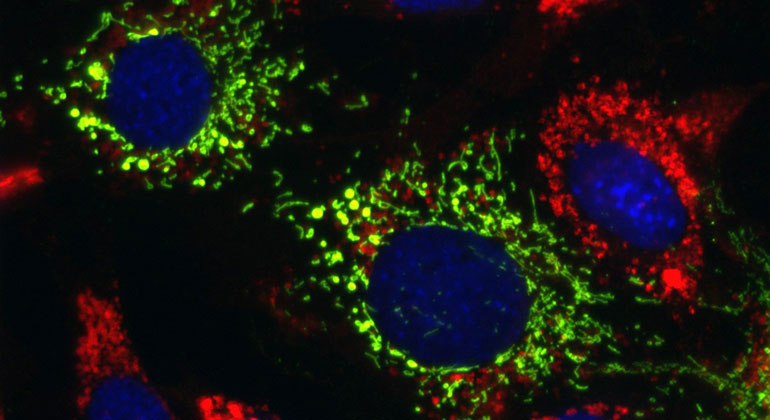Researchers Identify a Potential Path Against Inherited Neurological Disease

Researchers at the Icahn School of Medicine at Mount Sinai and NCATS identified compounds that reversed the effects of several neurodegenerative diseases called lysosomal storage disorders (LSDs) in patient cells and mice. LSDs are characterized by genetic defects that prevent the cell’s lysosomes from breaking down and recycling fats, sugars and proteins, which can accumulate in the liver and brain. This can cause a malfunction in the energy-producing mitochondria. The compounds increased the activity of TRAP1, a protein that helps the mitochondria work properly. Above, lipid-filled lysosomes (red) from Niemann-Pick disease type C1 cells are normalized when mitochondrial TRAP1 (green) is activated. Ioannou Lab, Department of Genetics and Genomic Sciences, Icahn School of Medicine at Mount Sinai
Main Takeaways: Scientists at the Icahn School of Medicine at Mount Sinai in New York, the National Center for Advancing Translational Sciences (NCATS), and elsewhere have reversed the effects of several life-threatening inherited neurodegenerative diseases called lysosomal storage disorders (LSDs) in patient cells and mice.
The team led by Mount Sinai’s Yiannis Ioannou, PhD, and translational scientist Juan Marugan, PhD, at NCATS, part of the National Institutes of Health, restored the proper function of both the mitochondria and lysosomes by using novel compounds they identified that increased the activity of TRAP1. This protein helps the mitochondria, which produce energy within cells, function properly. The findings were reported recently in iScience.
Dr. Ioannou is a Professor of Genetics and Genomic Sciences at the Icahn School of Medicine at Mount Sinai.
LSDs are characterized by genetic defects that prevent the cell’s lysosomes from breaking down and recycling fats, sugars, and proteins, leading to their accumulation in organs, including the liver and brain. This can cause a malfunction in the mitochondria, leading to further damage to these organs.
What Did the Study Seek to Uncover? Researchers have long been looking for drugs that could affect the lysosomes to try to impact lysosomal storage diseases. This is a new approach to these diseases. Increasing TRAP1 activity promoted mitochondrial protein-folding and facilitated the cell’s proper balance. These first-in-class molecules activate TRAP1 in the mitochondria and reduce storage in lysosomal storage diseases.
Study Conclusions: The data demonstrate that mitochondrial TRAP1 is a potential novel therapeutic target for multiple disorders that affect the central nervous system. The researchers discovered that TRAP1-initiated a “crosstalk” between mitochondria and lysosomes which, they determined, was essential to restoring the internal cellular balance. What is surprising, noted the researchers, is that TRAP1, when activated, initiates a cascade that leads to restoration of normal lysosomal function in lysosomal storage diseases. The defect causing each lysosomal disease is still present, but this crosstalk bypasses the genetic defect. The team showed that increasing the activity of TRAP1 in cells from people with Niemann-Pick disease type C1, a type of LSD, could correct the lipid storage disorder and restore normal cholesterol levels. In addition, increasing TRAP1 activity in patient cells from other LSDs such as Fabry, Farber, and Wolman diseases also corrected their respective lipid storage. (Niemann-Pick disease type C1 is a rare inherited disorder that affects the body's ability to metabolize fat within cells.)
Why Is the Research Important? The researchers suggest the findings could have implications for other neurodegenerative diseases that have similar underlying causes, such as Parkinson’s, amyotrophic lateral sclerosis, and Alzheimer’s.
How Was the Study Conducted? Dr. Ioannou and his colleagues developed a test to measure the effect of compounds on Niemann-Pick disease type C1. They teamed up with Dr. Marugan and NCATS scientists who used the test with NCATS’ high-throughput screening facilities to rapidly sift through thousands of compounds.
They discovered that compounds that activated TRAP1 made the mitochondria work properly again and restarted the lysosomes’ recycling ability, helping reduce fats in the lysosomes and cells. The researchers chemically improved the compounds that appeared to work best and tested them further.
Next Steps: The scientists would like to understand more about how the compounds can reverse characteristics of the lysosomal storage diseases, which will be instrumental in developing potential drug treatments. They also plan to continue refining these compounds and examining their effects in various models, including their ability to affect more common neurological disorders such as Alzheimer’s and Parkinson’s diseases.
Paper Title: Activation of mitochondrial TRAP1 stimulates mitochondria-lysosome crosstalk and correction of lysosomal dysfunction
To request a copy of the paper or to schedule an interview with Dr. Ioannou, please contact Karin Eskenazi at karin.eskenazi@mssm.edu at 332 257-1538.
About the Mount Sinai Health System
Mount Sinai Health System is one of the largest academic medical systems in the New York metro area, with 48,000 employees working across seven hospitals, more than 400 outpatient practices, more than 600 research and clinical labs, a school of nursing, and a leading school of medicine and graduate education. Mount Sinai advances health for all people, everywhere, by taking on the most complex health care challenges of our time—discovering and applying new scientific learning and knowledge; developing safer, more effective treatments; educating the next generation of medical leaders and innovators; and supporting local communities by delivering high-quality care to all who need it.
Through the integration of its hospitals, labs, and schools, Mount Sinai offers comprehensive health care solutions from birth through geriatrics, leveraging innovative approaches such as artificial intelligence and informatics while keeping patients’ medical and emotional needs at the center of all treatment. The Health System includes approximately 9,000 primary and specialty care physicians and 10 free-standing joint-venture centers throughout the five boroughs of New York City, Westchester, Long Island, and Florida. Hospitals within the System are consistently ranked by Newsweek’s® “The World’s Best Smart Hospitals, Best in State Hospitals, World Best Hospitals and Best Specialty Hospitals” and by U.S. News & World Report's® “Best Hospitals” and “Best Children’s Hospitals.” The Mount Sinai Hospital is on the U.S. News & World Report® “Best Hospitals” Honor Roll for 2025-2026.
For more information, visit https://www.mountsinai.org or find Mount Sinai on Facebook, Instagram, LinkedIn, X, and YouTube.